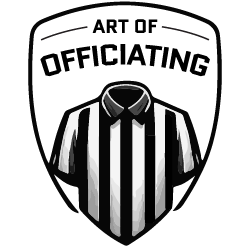I’ve confessed my love for cooking-related television shows and social media videos. On an episode of Hell’s Kitchen, a young chef was lamenting the fact that she did not know how to prepare a popular dish that was on that evening’s menu:
“You only know what you’ve been exposed to.”
I’m always looking around for quotes and anecdotes that apply to football officiating.
Too often, officials assume they’ll improve just by working a few games a week. On-field experience does matter—but only when paired with intentional exposure to the foundational officiating components. If you only think about football officiating while walking to the field for your next game, your growth will be slow, limited, and frustrating—for you, your crew, and the coaches and players.
If you want to improve, you need to broaden your experience. Here are a few of the best ways to amplify your exposure to the craft of officiating:
1. Watch other crews work
You can learn a lot by stepping back and observing someone else’s mechanics, positioning, and communication. Reach out to a respected game referee and ask if you can observe the pregame. Then walk the sidelines behind each wing official (switch sides at the half). Watch how a wing handles an obnoxious coach. Pay attention to how the wing officials cover a goal-line play. Watch how they mark forward progress. Observe how they focus on their keys. If you’re an umpire or back judge, focus on those positions.
2. Watch game film—often
If you have access to Hudl, you’ve got more than enough game film to watch. Break down your own performance and others’. Observe what “right looks like,” then look for missed keys, positioning errors, or how fouls were (or weren’t) handled. Ask yourself: What was this official looking at? Was his movement correct? Did he sell the call or look tentative? Even watching college or pro film with a critical eye will help you improve.
3. Join football officiating forums or groups
Online platforms like Facebook groups, Discord channels, or dedicated forums connect you with thousands of officials around the country. You’ll get exposure to philosophies, rules interpretations, game situations, and even mechanics variations. You’ll see what others are struggling with—and what they’re doing well. Just be wary when forum members discuss rules questions. Some officials will incorrectly answer a question “off the cuff” without knowing the related rules book citation.
4. Find a mentor—and interact often with him or her
A good mentor can accelerate your development by years. Ask them how they prepare. Debrief with them after your games. Invite constructive feedback and welcome their wisdom.
5. Regularly study the rules book and mechanics manual
This one seems obvious, yet so few officials actually do it. You can’t enforce what you don’t understand. Some rules knowledge is simply “brute force memorization,” but also make sure you understand the “why” behind the rule. Make it a habit to read just a few rules or case plays each day. It adds up.
Exposure is what separates officials who plateau from those who excel. You can’t improve if the only reps you get are during live action. The best officials treat the off-field work as seriously as the on-field moments.
Don’t wait until game night to care. Get exposed.
Quiz
Read the quiz stem and then choose the best answer.
3/10 from the A-20. The score is tied with 1 second remaining in the fourth quarter, and both teams are out of timeouts. A12 takes the snap and immediately takes a knee. As A12 starts to rise, and after the game clock has expired, B17 rushes in from his right defensive end position and slams into A12, knocking him to the ground. The referee throws a flag for a personal foul.
- The game clock expired before the foul. Team A must decline the penalty
- Team A will next snap from the A-35 and have one untimed down
- Team A can enforce the penalty on the first overtime snap
Review Rules 3-3-3, 3-3-6, 9-4-3b
